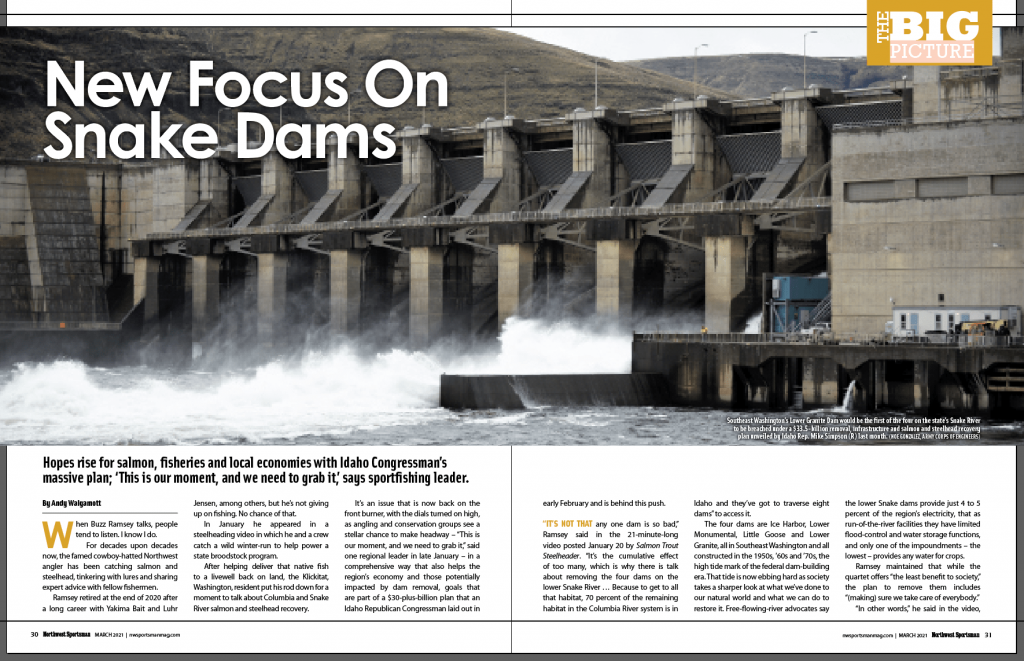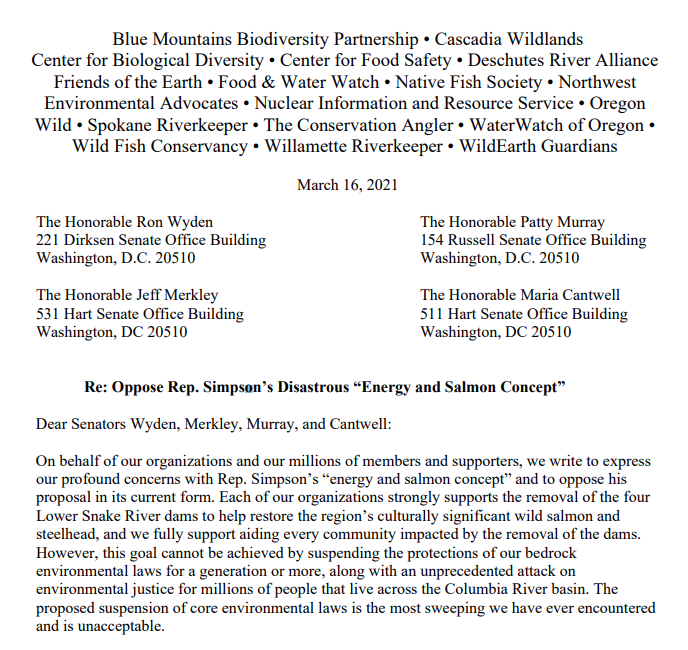
Idaho Rep’s Salmon-saving Idea ‘Disastrous’: Enviros Opposed To Lawsuit Ban
A highly litigious environmental cadre has come out against a sweeping plan to breach four lower Snake dams, calling the concept “disastrous” as it would bar them from lobbing lawsuits over the river and salmon for multiple decades.
It’s a mind-bending declaration, but also “shooting holes in the boat as usual” for two particular dot-orgs involved and which are known to throw monkey wrenches into collaborative efforts and middle-of-the-road accords in the Northwest.
Overall, the 17 organizations are reacting to Rep. Mike Simpson’s “Energy and Salmon Concept,” the Idaho Republican’s landmark $33-plus-billion regional path forward for recovering salmon and steelhead, replacing lost hydropower, helping farmers and communities adjust to the change, and more.
Released last month, it has united sport anglers, numerous tribes, river advocates, conservation groups, editorial boards and others from Boise to Portland to Spokane and beyond; we featured it on our blog and as “The Big Picture” conservation focus in our March magazine.

But the inclusion of 25- and 35-year moratoriums on Clean Water, Endangered Species and National Environmental Policy Acts-related lawsuits over water and anadromous issues has the environmental groups – which include the Wild Fish Conservancy and Center For Biological Diversity – calling on Oregon and Washington’s US Senate delegation to oppose it.
In a letter, they say Simpson’s comprehensive plan’s primary “goal cannot be achieved by suspending the protections of our bedrock environmental laws for a generation or more, along with an unprecedented attack on environmental justice for millions of people that live across the Columbia River basin. The proposed suspension of core environmental laws is the most sweeping we have ever encountered and is unacceptable.”
To be clear, they support removing Ice Harbor, Lower Monumental, Little Goose and Lower Granite Dams; even moderate groups see the package as far from a finished product; and government and business needs to be held accountable for project impacts.

But their letter to Sens. Ron Wyden, Jeff Merkley, Patty Murray and Maria Cantwell also re-revealed “a rift among environmental and conservation groups,” wrote Eli Francovich of the Spokane Spokesman-Review, who first reported it.
WFC and CBD, in particular, are known for working to derail hard-won gains and broadly supported initiatives on wolves and steelhead in Washington through repeated court attacks that sometimes resemble trying to meet monthly quotas. They do moderate environmentalists – a group that would include this sportsman – no favors with their hard line, burning bridges without building any in their puritanical zeal.
It’s an approach that belies the old saying, a rising tide floats ALL boats.
Sam Mace of Save Our Wild Salmon called the group’s letter “way premature,” per Francovich, while Trout Unlimited’s Greg McReynolds told him, “Frankly, from a fish perspective, this is it. We have, like, 20 years before we completely lose salmon and steelhead in the Snake River Basin. Everybody has concerns that are valid, but you can’t use valid concerns as an excuse to do nothing.”
Simpson said that “groups who call my concept a ‘nonstarter’ and ‘dead wrong’ are more concerned about ending litigation against Northwest dams and agriculture than actually helping the fish and improving the watershed,” according to the reporter.
The Congressman aims to break the region out of its status-quo, “never-ending” courtroom fight over the dams, biological opinions, appeals and more – now in its “eighth incarnation” – and he notes that despite $17 billion spent on recovering fish over the past three decades “we have more salmon and steelhead runs listed under the ESA today than we did in 1980.”
One signer of the letter to the senators bemoaned that it was left to a Gem State Republican (and his staff) to come up with a path forward on recovering salmon, steelhead and the Snake.
“Where are the creative Democrats?” David Moskowitz of Portland’s The Conservation Angler told Eric Barker of the Lewiston Tribune. “Plenty of their constituents support making a change and don’t support the status quo, and we don’t support the status quo even though we are opposed to this proposal as written.”
“I’m conservative, and I also value conservation,” Simpson told Columbia Insight.
Under his plan, only farmers who join a partnership to improve water quality would actually receive a 25-year exemption to Clean Water and ESA lawsuits, with so-called “bad actors” not receiving any protection.
Litigation centered on salmon, steelhead, lamprey and other sea-going species and dams in the Columbia and Snake mainstems, along with projects generating more than 5 megawatts in the basin, would be on hold for 35 years for everything but safety issues.
Those also opposed include Idaho’s governor and state senators, Southeast Washington county commissioners and others.
“I guess it’s a good concept/proposal when you have extremes from both sides unhappy with it,” someone noted to me this week.
The impetus to do something Right Now is related to four things:
A unique alignment of Northwest lawmakers in powerful positions – including the aforementioned quartet – back in Washington DC; science suggesting the dams are the primary driver of smolt-to-adult survival rates that for Idaho salmon and steelhead are “on a trajectory to extinction”; the plight of Washington’s orcas; and a multi-trillion-dollar infrastructure and energy stimulus proposal from the Biden administration expected sometime later this year that this proposal could be hitched to.
